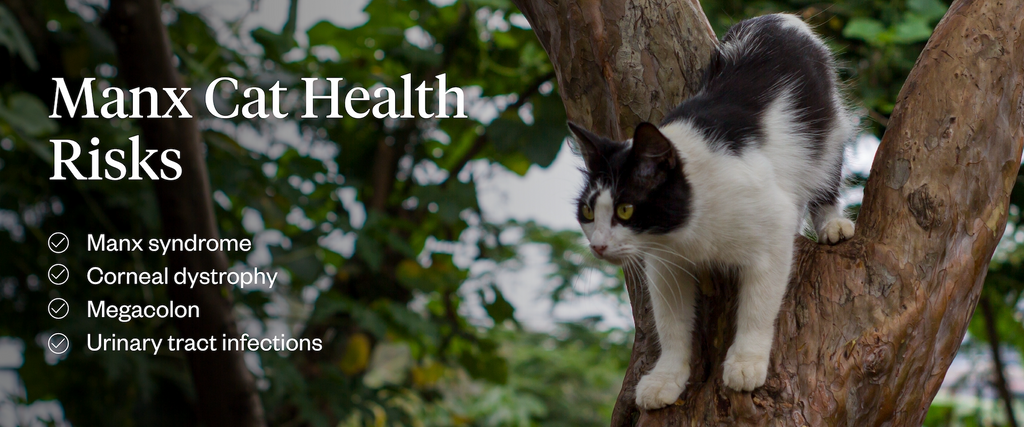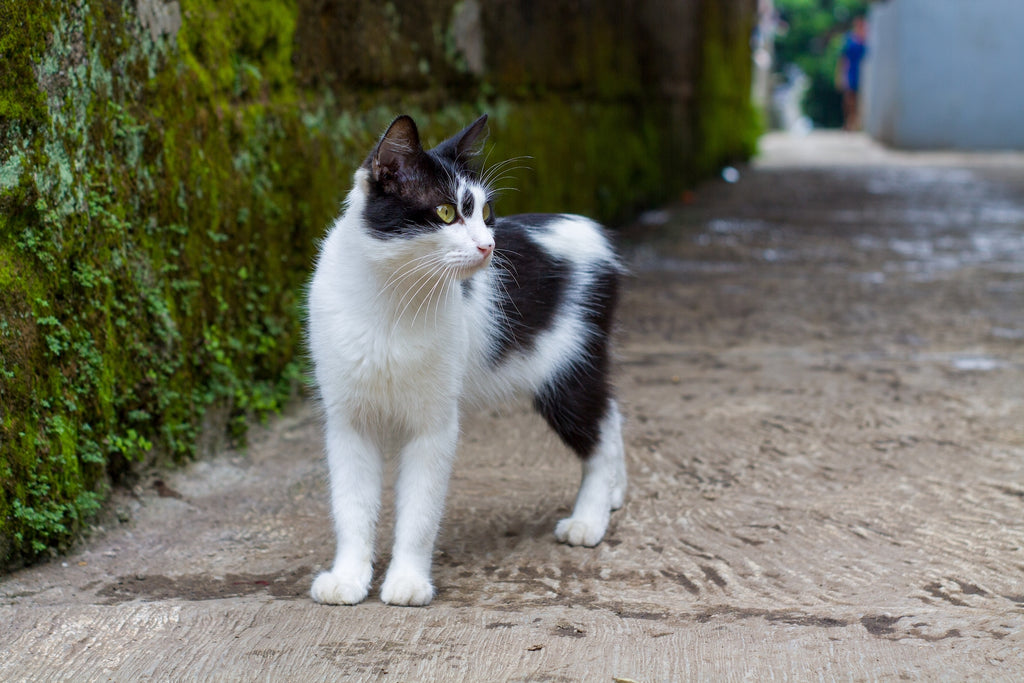8 Min Read
Manx Cat: Pet Profile
Key takeaway

Why pet owners are switching to online vet care with Dutch
-
Prescriptions delivered free to you
-
Fast access to Licensed Vets over video
-
Unlimited video visits and follow-ups
Manx cats are unique because they are one of the few cat breeds that lack an obvious tail. This tailless appearance — along with some excellent behavioral traits — makes the Manx popular among cat lovers.
While the Manx cat is popular among cat lovers, owning a Manx cat or Maine Coon is a little different from the average domestic cat. Different cat breeds have unique needs and health issues, and taking care of a Manx cat can be expensive. It’s smart to calculate the costs of pet ownership before you decide on a Manx cat over other cat breeds.
Are you considering a Manx cat as a pet? Here’s everything you need to know, from the history of Manx cats to how to care for them.
- History & Origin Of Manx Cats
- Physical Attributes Of Manx Cats
- Behavioral Characteristics Of Manx Cats
- Manx Breed Health Risks
- Caring For a Manx Cat
- Manx Cat: FAQs
- Final Notes
History & Origin Of Manx Cats
The origin of the Manx cat isn’t entirely known, but we do know that Manx cats have been around for hundreds of years. In fact, the Manx cat can be traced back to at least 1750.1 The breed comes from the Isle of Man, a small island between Ireland and Great Britain — which is where it gets its name.
The Manx cat originally became popular for its tailless appearance — something you won’t find in any other cat breed. While the lack of tail is caused by a genetic mutation, the cause of that mutation or exact origin of the breed is unknown.
As one of the first breeds at early cat shows in Great Britain and a founding Cat Fanciers Association (CFA) breed, the Manx cat has a lot of history. However, it wasn’t until 1979 that The International Cat Foundation (TICA) recognized the Manx cat as one of its official breeds.1
Physical Attributes Of Manx Cats

Without a doubt, the most unique physical attribute of the Manx cat is the lack of a tail. Manx cats don’t have tails because of a genetic mutation, and they’re the only cat breed that doesn’t have a tail. While many people love the unique look of Manx cats, the lack of a tail can also contribute to certain health problems.
Manx cats don’t have a tail because of a mutation in a gene that’s labeled M. This gene causes the tail as well as the vertebrae near it to develop abnormally. All Manx cats have a mutant M gene and a normal m gene (written as Mm), with the mutant gene being dominant. Cats with two mutant genes (MM) die during early fetal development, which is why the Manx gene is sometimes called a lethal gene.2
Manx cats can be born without a tail, with a stubby tail, or with a full-length tail.3 Like Japanese Bobtail cats, Manx cats look similar to other domestic cats aside from their tails. Manx cats have a sort of soft and round look that many cat lovers enjoy.
Behavioral Characteristics Of Manx Cats
Different cat breeds can behave a little differently, but Manx cats typically behave in a pretty standard manner for domestic cats. Manx cats usually are fun, affectionate, and intelligent, making them great pets.
Because Manx cats have strong hindquarters, they’re great at jumping and often enjoy jumping to play and explore new spots. The Manx cat breed is also known for intelligence, with some Manx cats learning how to use their paws to turn door handles. Some Manx cats even bury their toys like dogs do.
Oftentimes, Manx cats are relatively quiet. You won’t usually hear a lot of meowing or crying out of your Manx cat, but they can be a little more talkative at times.3 Manx cats can also make a unique trilling sound at times.
An even temperament is one of the best common Manx cat characteristics. Manx cats are generally very friendly and affectionate and love to be around people, which makes them great for families with children. In fact, your Manx cat may prefer spending most of their time with you.
Manx Breed Health Risks

From the Lykoi to the Manx cat breed, several breeds face unique obstacles when it comes to health. Understanding the health risks that are common in Manx cats can help you keep your cat healthy.
Manx syndrome is what causes Manx cats to have no tail, but that’s not the only effect it has. In addition to causing Manx cats to be born without a tail, Manx syndrome can also cause urinary tract problems, digestive problems, and spine issues. These issues develop early on (typically before 4 months).4
In addition to Manx syndrome, the Manx cat population is also at higher risk for corneal dystrophy.4 This eye disorder also develops at an early age, but it doesn’t typically cause blindness in cats.
Caring For A Manx Cat
Taking care of your Manx cat can be a busy job, but it’s easier when you know what you’re doing. Cat care starts with understanding potential health risks and how to handle them, but it’s also about diet and nutrition, exercise, grooming, and more.
Diet & Nutrition
Manx cats — like all cats — are obligate carnivores, which means their diet consists of more than 70% meat.5 This also means that they have a harder time digesting vegetables and other plant-based food sources.
Feeding your cat a healthy diet is essential, and that starts with choosing the right cat food. Your vet can help you select a brand that’s right for your Manx cat. The key is finding meat-based cat food that has all the nutrients your cat needs to be healthy, including amino acids, minerals, vitamins, fats, and fatty acids. Your vet may also recommend specialty cat food if your Manx cat has a weight problem or certain medical issues.
Grooming
While cats usually do a good job of grooming themselves, they still need a little help from time to time. Grooming can help prevent issues like matting and tangling, keeping your Manx cat’s coat healthy and shiny.
You can take care of your cat’s coat by brushing them a few times a week. Brushing your cat helps remove dead skin and loose hair, which can also help you prevent shedding.
Your Manx cat also needs a little maintenance during grooming, which includes nail trimming, eye cleaning, and ear cleaning. You should groom your cat about once a month, or you can take them to a vet if you’re not comfortable trimming their nails or cleaning their ears.
Exercise & Enrichment
Manx cats love to play and have fun, so it’s your job as a pet parent to make sure they get plenty of exercise and enrichment. You should play with your Manx cat for about 20-60 minutes each day to keep them entertained. You can invest in cat toys, lick mats, scratch mats, and cat trees. Supervised outdoor time is also a good way to let your Manx cat play, and catios give them a safe place to play and explore outside. As long as your cat gets some playtime each day, you’re doing a good job.
Preventative Care & Veterinary Check-Ups
Preventing medical problems is the best way to keep your Manx cat happy and healthy, and your vet can help. You should be taking your cat to the vet for annual check-ups to monitor their weight and check for general health problems.6
Parasite prevention is also key, which means you need to give your cat preventative medication on a regular schedule. Revolution Plus provides protection from six parasites, while Credelio and other similar medications are designed for fleas and ticks. You can talk to your vet to learn more about flea and tick prevention.
Manx Cat: FAQs
Are Manx cats rare?
Manx cats aren’t necessarily the rarest cat breed, but they’re rarer than many domestic cat breeds. The unique physical characteristics and charming behavior of Manx cats make them a popular choice among cat enthusiasts. From individual cat parents to families with small children, Manx cats typically make great pets.
Why do Manx cats not have tails?
Manx cats don’t have tails as a result of a genetic mutation. The mutant M gene dominates the regular m gene (written as Mm), which affects the way the tail and the connected part of the spine form. While most Manx cats don’t have tails, some do. Genetic mutations can cause Manx cats to have no tail, a stubby tail, or a full-length tail.
Are Manx cats low maintenance?
Manx cats are low maintenance in terms of grooming because they have short to medium-length coats. Manx cats don’t require a ton of grooming or other maintenance like long-haired breeds do. However, Manx cats are also susceptible to certain health problems, which can make them harder to care for.

Final Notes
If you’re looking for a fun and affectionate cat with a unique appearance, a Manx cat may be perfect for you. Manx cats are usually well-behaved and do well around children and other pets, which makes them great for families. However, Manx cats are also prone to certain health conditions, which can make care challenging.
Dutch can help you take care of your feline friends to keep them happy and healthy. With telemedicine for pets, you can schedule an online video appointment with a vet and get pet prescriptions delivered, so you can save time without sacrificing care. Try Dutch and see how we can help you simplify pet care.
Share
References
-
"Manx Cat." Encyclopaedia Britannica. https://www.britannica.com/animal/Manx-cat.
-
Universities Federation for Animal Welfare (UFAW). "Manx Syndrome in Manx Cats," https://www.ufaw.org.uk/cats/manx-manx-syndrome.
-
The International Cat Association (TICA). "Manx Breed Standard," https://www.tica.org/breeds/browse-all-breeds?view=article&id=837:manx-breed&catid=79.
-
People's Dispensary for Sick Animals (PDSA). "Manx Cats - Advice and Information," https://www.pdsa.org.uk/pet-help-and-advice/looking-after-your-pet/kittens-cats/manx.
-
Texas A&M University College of Veterinary Medicine & Biomedical Sciences. "Cats Are Carnivores, So They Should Eat Like One," https://vetmed.tamu.edu/news/pet-talk/cats-are-carnivores-so-they-should-eat-like-one/.
-
Merck Veterinary Manual. "Routine Health Care of Cats," https://www.merckvetmanual.com/cat-owners/routine-care-and-breeding-of-cats/routine-health-care-of-cats.

